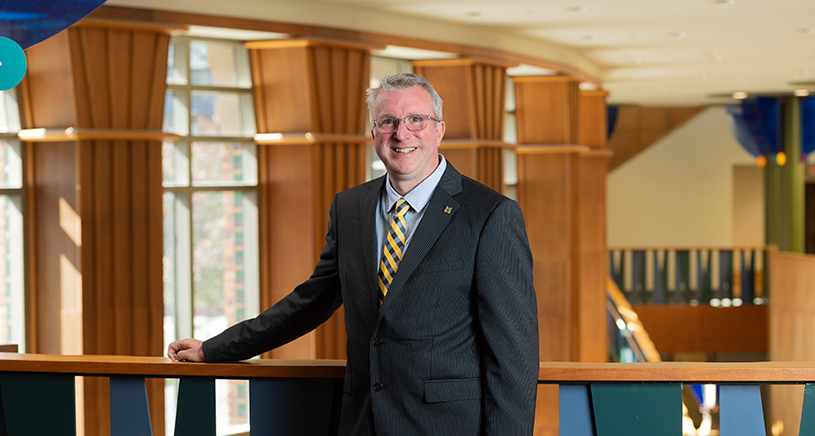Courses Taught by Alex Rickard
EPID504: Polymicrobial Communities Laboratory
- Graduate level
- Residential
- Fall term(s) for residential students;
- 3 credit hour(s) for residential students;
- Instructor(s): Alex Rickard (Residential);
- Offered Every Fall
- Prerequisites: Permission of the Instructor
- Description: This laboratory course provides an opportunity for students to become familiar with approaches and techniques to studying microbial diversity. Techniques to describe microbial diversity at the structural, behavioral, and ecosystem level will be addressed. Emphasis will be placed on approaches to understand diversity within the human microbiome and environmental systems as well as the interactions between them.
- Learning Objectives: Three learning objectives include: (1) Learn and perform laboratory techniques to describe microbial diversity as well approaches to analyze the results of experiments. (2) Realize the impact microbes on the environment as well as on the human microbiome and understand how these communities may interact with one-another. (3) Participate in a scientifically-based class debates and contribute towards the formulation of laboratory experiments.
- This course is cross-listed with Pilot course so not yet cross-listed but upper-level undergraduate students and graduate students from other departments will be considered. in the Pilot course so not yet cross-listed but upper-level undergraduate students and graduate students from other departments will be considered. department.

| Department | Program | Degree | Competency | Specific course(s) that allow assessment | EPID | Hospital and Molecular Epidemiology | MPH | Demonstrate sterile technique and an understanding of fundamental lab safety measures | EPID504 |
|---|
EPID505: Polymicrobial Communities in Human Health and Disease
- Graduate level
- Residential
- Fall term(s) for residential students;
- 3 credit hour(s) for residential students;
- Instructor(s): Alex Rickard (Residential);
- Last offered Fall 2019
- Not offered 2024-2025
- Prerequisites: None
- Undergraduates are allowed to enroll in this course.
- Description: Regions of focus for the study of the human microbiome (image taken from http://nihroadmap.nih.gov/hmp/ ) This course provides an opportunity for students to become familiar with the concept that humans contain more than just an organized assemblage of mammalian cells. In addition to our human cells, there are numerous microbial inhabitants- many are bacteria. Indeed, on a per-cell basis, these bacteria outnumber human cells by at least an order of magnitude. How resident bacteria interact with one another and with transient (often pathogenic) bacterial species is important to understand because these interactions can promote health or potentially aid the transition towards disease. One such example of these interactive polymicrobial communities can be found in dental plaque, where 400 species of bacteria can cohabitate, and their physical and chemical interactions play a role in the colonization of pathogenic species. In this case, disease can be manifested as periodontitis. Other examples of microbial communities of the body that will be studied in this course include skin/wounds, the upper-respiratory tract, the gut and the urogenital tract. Overall, this course will describe the microbial ecology of the human body and driving forces promoting the transition from those communities associated with health to disease-causing communities. Special emphasis will be given to cutting-edge laboratory techniques when exploring the microbial ecology of the human body. This course will culminate with a broad overview of the current understanding of the human microbiome and potential associated social ramifications of future research.
- Learning Objectives: Four learning objectives include: (1) Learn about the complexity of the human microbiome and techniques that are available to study the ecology of human-associated microbial communities. (2) Realize the impact of the microbial inhabitants of humans on health and disease and be able to describe microbial factors that promote the transition towards diseased states. (3) Participate in a scientifically-founded class debate: Addressing the legal, ethical and social ramifications raised by research into the human microbiome. (4) Understand cutting-edge research and review articles discussing results of investigations of the human microbiome. Furthermore, each student will use these articles to develop a paper which outlines a plan to study the ecology of host-associated microbial communities in health and/or disease.

PUBHLTH460: Introduction To Bacterial Pathogenesis
- Undergraduate level
- Residential
- Winter term(s) for residential students;
- 3 credit hour(s) for residential students;
- Instructor(s): Alex Rickard (Residential);
- Not offered 2024-2025
- Prerequisites: Pubhlth 370 or Bio 207, AND Pubhlth 311 or Bio 305
- Description: Microbial structures and their relation to basic mechanisms of bacterial pathogenesis; structure, function, and genetics of bacterial toxins; and host resistance and immunity. Discussions of pathogenic organisms of major public health importance, diseases caused, and their epidemiology.
- Learning Objectives: 1. Understand the role played by bacteria in human health and disease. 2. Understand how genetic transfer mechanisms can lead to bacteria with increased virulence and antibiotic resistance. 3. Understand how bacterial toxins and other virulence factors help bacteria cause disease. 4. Understand public health approaches to preventing bacterial diseases. 5. Understand how antibiotics kill bacteria and how bacteria become resistant to them.
- This course is cross-listed with EPID 560 in the Epidemiology, SPH department.
- Syllabus for PUBHLTH460

